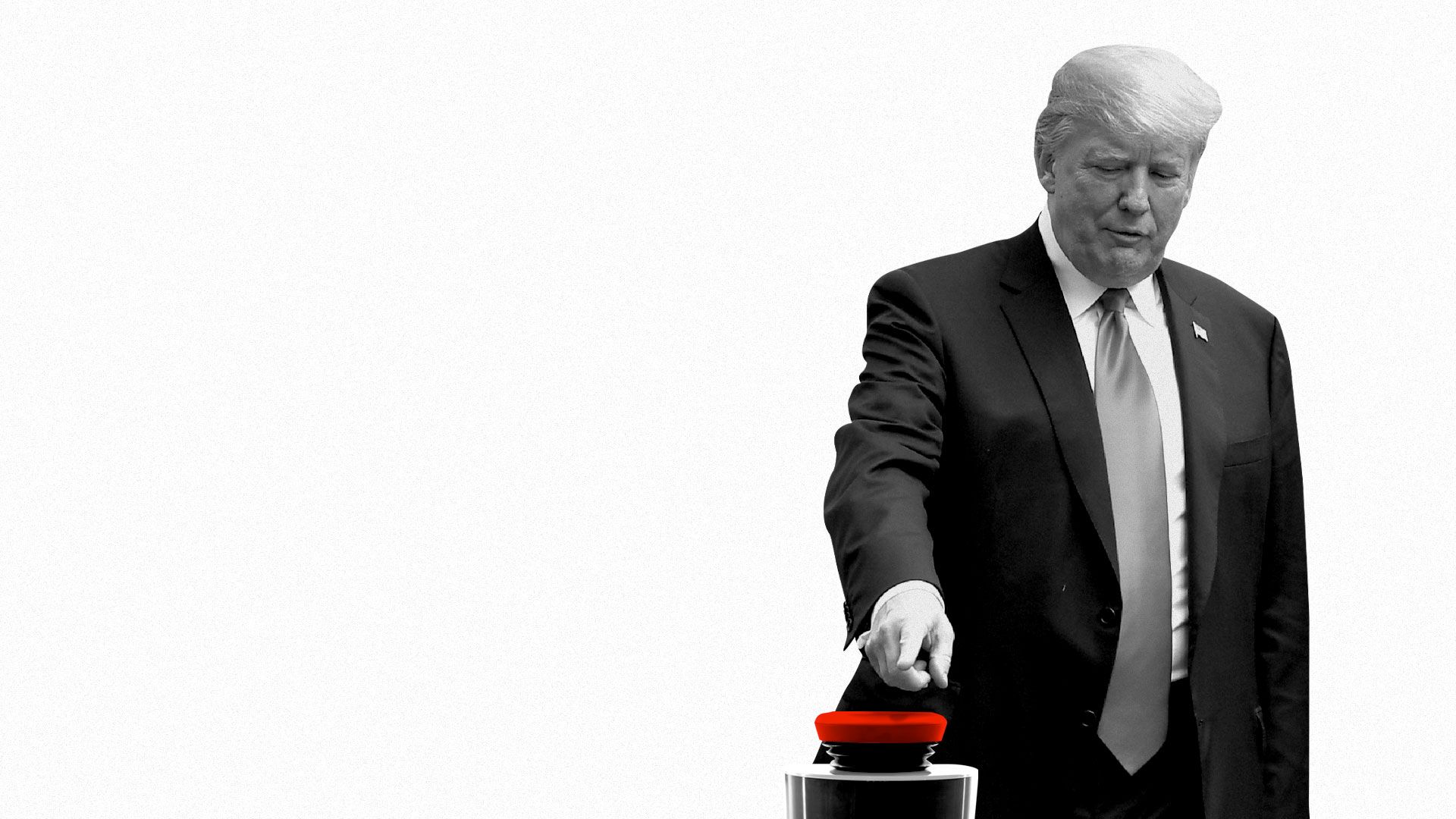Inside Trump's obsession with Iranian gunboats
Add Axios as your preferred source to
see more of our stories on Google.

Illustration: Eniola Odetunde/Axios
President Trump's declaration about directing the Navy to "shoot down and destroy" Iranian gunboats brings to a head his years of urging military leaders to get tougher on Iranian harassment at sea.
Why it matters: Now — unlike in the days when James Mattis ran the Defense Department and often ignored what he viewed as intemperate orders from Trump — the president faces no meaningful resistance from his national security team.
Between the lines: The risks of another confrontation with Iran have escalated as coronavirus overwhelms the world.
- Trump often looks for shiny distractions during crises and has done so repeatedly in this case.
- But regardless of his motivations for returning to this threat now, his desire to target Iranian gunboats is almost as familiar to aides as his enthusiasm for building the wall.
After Trump's Twitter warning Wednesday against harassing American ships in the Persian Gulf, reporters grilled top Pentagon officials about how Trump's threat comports with rules of engagement giving naval commanders authority to use lethal fire if they think their ship is in danger.
- Joint Chiefs of Staff Vice Chairman Gen. John Hyten embraced Trump's tweet: "Nobody should doubt that the commanders have the authority right now . . . to respond to any hostile act or hostile intent."
- The phrase "hostile intent" as a possible condition for retaliation sends a strong signal. It's in the eye of the beholder. The Navy hasn't previously viewed harassment of U.S. ships by small Iranian boats as rising to the level of firing back.
Driving the news: Last week, the U.S. military said 11 boats from Iran's Islamic Revolutionary Guard Corps Navy veered dangerously close to U.S. ships in the Gulf.
- Iran on Wednesday put into orbit what it described as a "military satellite" and has responded with its own threat.
- "If Tehran tests this new red line, and if U.S. backs down from its threat, deterrence would take a huge hit," said Behnam Ben Taleblu, an Iran expert at the Foundation for Defense of Democracies.
Behind the scenes: Trump lives in fear of Iran taking U.S. military personnel hostage. He wants, at all costs, to avoid scenes of American weakness and humiliation playing across the world's screens, current and former advisers say.
- He connects Iran — and its actions at sea in particular — to this image.
- Another factor: Trump views the subject of Iranian gunboats — as he does so many other things — through the prism of Barack Obama. He's told aides he'll never let U.S. sailors be filmed captured by Iran, on their knees.
Flashback: As I reported in January 2019, of all the disagreements that drove Trump and Mattis apart, one of the most perilous had to do with blowing up Iranian boats.
- Trump repeatedly asked his national security team for plans to blow up Iranian "fast boats" in the Persian Gulf during the first year of his presidency, according to two sources who directly heard Trump's requests and three other former senior officials briefed on them.
- Mattis refused to do so. He never provided the plans and simply ignored the requests of former national security adviser H.R. McMaster, according to three former officials involved in the deliberations.
Here are reasons to take the president's threat seriously now:
- Four sources who've been in private conversation with Trump when he's discussed blowing up Iranian gunboats say that when he returns to a subject this often and passionately, there comes a time when even the most skeptical aides lose power to deter him.
- He shocked some of his own aides by authorizing the killing of Iranian General Qasem Soleimani.
- Unlike previous points in his administration when his national security team resisted him, leadership of the Pentagon, State Department and National Security Council have largely aligned on this subject, according to sources familiar with internal deliberations.
The other side: On several important occasions — including when Iran shot down an unmanned American drone over international waters — Trump backed off from retaliating more aggressively against Tehran despite urgings by advisers including former national security adviser John Bolton.
The bottom line: Naval commanders have maximum flexibility with Trump as commander in chief. Trump has now made clear they won't be reprimanded if they decide to take him at his tweet.
